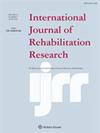Effects of core strengthening on balance in patients with hip osteoarthritis: a randomised controlled trial.
IF 1.3
4区 医学
Q3 REHABILITATION
International Journal of Rehabilitation Research
Pub Date : 2023-09-01
Epub Date: 2023-04-17
DOI:10.1097/MRR.0000000000000579
引用次数: 0
Abstract
Osteoarthritis is a condition commonly present in the elderly, with many having altered balance, aggravated with weak lower limb and core musculature predisposing them to falls. Despite the knowledge about the link between balance and core stability, studies investigating the importance of core stability exercise and their impact on balance are limited. Therefore, the authors aimed to explore whether core strengthening exercises in combination with hip exercises, when compared to a hip exercise programme and a control group, led to better improvements in balance in patients with hip osteoarthritis. In order to meet these aims, this paper reports the outcomes of a randomized, three-arm parallel, assessor-blinded, controlled clinical trial. Fifty-one participants awaiting a total hip replacement were recruited into this study. All patients were randomly allocated to a control, hip exercise group and hip and core exercise group. All participants were assessed for core muscle strength using a pressure biofeedback unit and balance using the four-stage balance test. The control group had no intervention. A 12-week hip and core exercise programme did not result in improvements over and above the hip exercise group in balance scores. However an improvement in core stability was noted for the hip and core exercise group (P = 0.001). Therefore, this study concluded that both exercise groups are resulted in improved balance with the core and hip exercise group noted to have added improvements, but the difference between the groups was not statistically significant.核心强化对髋骨关节炎患者平衡的影响:一项随机对照试验。
骨关节炎是一种常见于老年人的疾病,许多人已经改变了平衡,随着下肢和核心肌肉组织的虚弱而加重,使他们容易跌倒。尽管了解平衡和核心稳定性之间的联系,但调查核心稳定性锻炼的重要性及其对平衡的影响的研究有限。因此,作者旨在探讨与髋关节运动计划和对照组相比,核心强化运动结合髋关节运动是否能更好地改善髋关节骨关节炎患者的平衡。为了达到这些目的,本文报告了一项随机、三臂平行、评估盲、对照临床试验的结果。51名等待全髋关节置换术的参与者被招募到这项研究中。所有患者随机分为对照组、髋关节运动组和髋关节及核心运动组。所有参与者使用压力生物反馈装置评估核心肌肉力量,使用四阶段平衡测试评估平衡。对照组不进行干预。一个为期12周的髋关节和核心运动项目在平衡得分方面并没有比髋关节运动组有所改善。然而,髋关节和核心运动组的核心稳定性有所改善(P = 0.001)。因此,本研究得出结论,两组运动均能改善平衡,其中核心运动组和髋关节运动组有明显改善,但组间差异无统计学意义。
本文章由计算机程序翻译,如有差异,请以英文原文为准。
求助全文
约1分钟内获得全文
求助全文
来源期刊

International Journal of Rehabilitation Research
REHABILITATION-
CiteScore
3.10
自引率
0.00%
发文量
88
审稿时长
6-12 weeks
期刊介绍:
International Journal of Rehabilitation Research is a quarterly, peer-reviewed, interdisciplinary forum for the publication of research into functioning, disability and contextual factors experienced by persons of all ages in both developed and developing societies. The wealth of information offered makes the journal a valuable resource for researchers, practitioners, and administrators in such fields as rehabilitation medicine, outcome measurement nursing, social and vocational rehabilitation/case management, return to work, special education, social policy, social work and social welfare, sociology, psychology, psychiatry assistive technology and environmental factors/disability. Areas of interest include functioning and disablement throughout the life cycle; rehabilitation programmes for persons with physical, sensory, mental and developmental disabilities; measurement of functioning and disability; special education and vocational rehabilitation; equipment access and transportation; information technology; independent living; consumer, legal, economic and sociopolitical aspects of functioning, disability and contextual factors.
 求助内容:
求助内容: 应助结果提醒方式:
应助结果提醒方式:


